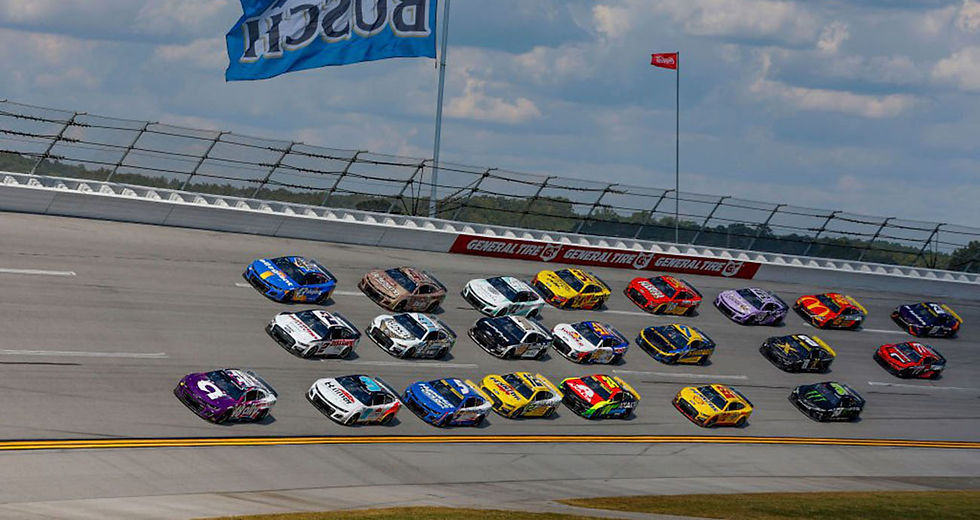Inside NASCAR’s Antitrust Showdown: How the RTA Lawsuit Could Redefine League Power
- Oliver Stevens
- Nov 17, 2025
- 4 min read
When NASCAR teams filed sweeping antitrust lawsuits in 2024, led by 23XI Racing and Front Row Motorsports, with support from the Race Team Alliance (RTA), they didn’t just challenge a sport’s business model. They put the entire franchise league power dynamic on trial. At stake is control over the economic engine of stock-car racing: the teams that build and race the cars, or the sanctioning body that owns the brand, the schedule, and the broadcast rights.
These lawsuits, now moving forward in federal court, spotlight a deeper question: how much authority can a governing body exert over the independent entities that make its product possible? NASCAR’s centralized control over media, sponsorships, and competition rules has long been a point of tension. Now, it’s a matter of legal scrutiny.
The Road to the Lawsuit
In October 2024, 23XI Racing and Front Row Motorsports filed a sweeping antitrust lawsuit against NASCAR, alleging that the sanctioning body’s control over media rights, sponsorships, and competition rules violates federal law by restraining trade and monopolizing the market for premier stock-car racing. The RTA, while not a named plaintiff, has long voiced similar concerns, and in 2025, it formally aligned itself with the suit’s objectives, submitting declarations and supporting the plaintiffs’ claims in court.
This shift marked a turning point. What began as a targeted legal challenge now reflects the grievances of nearly the entire Cup Series grid. NASCAR responded in April 2025 with a counterclaim accusing the teams of collusion and attempting to form a cartel. But in October, U.S. District Judge Kenneth Bell dismissed that counterclaim, allowing the teams’ Section 2 monopolization claims to proceed toward trial, now scheduled for December 1, 2025 (ESPN, Oct. 31, 2025).
According to Fox Sports, NASCAR President Steve Phelps said the organization is “trying our hardest to settle” the dispute, emphasizing that the sanctioning body wants to “keep this family together.” But as litigation proceeds, the “family” looks more fractured than ever. - This quote confirms that teams within the RTA are supporting the lawsuit, and that NASCAR is trying to negotiate with them, not fight them all in court.
What Teams Are Fighting For
At its core, the lawsuit is about economics. Teams argue that NASCAR’s central control of media revenue leaves them with too little to sustain operations, forcing a near-total dependence on corporate sponsorship. According to financial disclosures cited in the filings, Cup Series teams receive less than 25% of total industry revenue; a stark contrast to the 40–50% shares seen in the NFL and NBA.
A key structural issue is NASCAR’s charter system, implemented in 2016. The system grants 36 teams guaranteed starting spots in races, functioning like franchise licenses; but without the equity value or permanence of true ownership. The RTA contends that the limited, revocable nature of these charters keeps teams economically dependent on NASCAR, restricting their ability to negotiate media or sponsorship deals independently.
That imbalance, combined with rising operational costs and shrinking sponsor budgets, has left even major organizations in the red. ESPN reporting revealed that some teams are losing upward of $10 million annually, a figure that underscores just how strained the current model has become. The RTA’s core argument is that NASCAR’s monopoly over commercial rights, including TV and streaming deals, locks them out of the profits their performance drives.
Legal Stakes: The American Needle Parallel
While no U.S. sports league has faced this level of antitrust scrutiny in years, the case echoes a landmark precedent: American Needle v. NFL (2010). In that case, the Supreme Court ruled that NFL teams could not claim “single-entity” protection when jointly licensing merchandise, opening the door for antitrust liability when leagues suppress team-level competition.
NASCAR, like the NFL, has long operated as a centralized commercial entity. But unlike the NFL, its teams aren’t franchise owners; they’re effectively contractors. That distinction could make this lawsuit even more volatile. If the court determines NASCAR wields monopoly power over essential commercial markets (broadcasting, sponsorships, and licensing), the ruling could reshape how every major sports league negotiates media deals.
Inside the Fallout
The lawsuit has already reshaped the sport’s internal politics. The Drivers Advisory Council — a separate but influential body — released a statement calling for “unity and progress,” while cautioning that litigation risks “long-term damage to the ecosystem of the sport” (Motorsport.com, Oct. 2025). NASCAR’s leadership, meanwhile, has sought to calm the storm. At the Phoenix race weekend, Phelps told Autoweek that the sanctioning body was “fully committed to finding a long-term, sustainable business model for all stakeholders.”
Still, behind the diplomacy lies an existential fight. For teams, this is about securing a fair share of a multibillion-dollar ecosystem. For NASCAR, it’s about defending the structure that gives it unparalleled control and arguably, its brand identity.
What Comes Next
With discovery underway and settlement talks reportedly active, the next several months could determine whether this becomes one of the most consequential sports law cases in decades or a negotiated truce. Either way, the lawsuit has already forced a reckoning: NASCAR’s business model, once seen as immutable, is now under the legal microscope.
And if the teams succeed, or even force major concessions, it could set a precedent reaching far beyond Daytona. Every league that centralizes its commercial rights, from the PGA Tour to Formula 1, will be watching closely to see whether the courts decide that tradition and efficiency justify monopoly power, or that it’s time for a new balance between leagues and the teams that make them possible.
Oliver Stevens
1L, Hofstra Law









